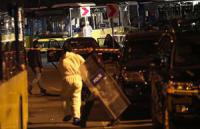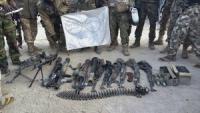-
All terror attacks are not connected – but terrorists want us to think they are

In just one weekend in December, a series of terrorist attacks killed nearly 200 people in five different countries – Germany, Turkey, Nigeria, Pakistan, Yemen, Egypt, and Somalia. This is a horrific spate of attacks, but while the resultant headlines are certainly alarming, all the attacks occurred in countries facing very specific challenges. Rolling them all together into one “wave” of violence is misguided, and misunderstands the real nature of global terrorist threats. Terrorism’s preeminent effects are psychological rather than a physical; it has a way of skewing our perceptions, meaning we perceive a bigger menace than actually exists. To fight it, we need to fight back against these psychological tricks. So long as we go on assuming that terrorist attacks are connected and trying to link them to a global extremist threat looming on our doorstep, we misunderstand the unique problems facing each country – and what’s needed to defang them.
-
-
Calls in Germany for bolstering surveillance in wake of Berlin attack
Klaus Bouillon, the interior minister in the German state of Saarland, said that “It is time to eliminate the barriers to monitoring suspects’ telephone conversations.” He also urged the revamping of a law for monitoring popular online encrypted messaging services, such as WhatsApp, and said that next month he would make a formal proposal to that effect. Bouillon, a member of Chancellor Angela Merkel’s Christian Democratic Union (CDU), said, “It cannot be the case that a company can make billions with WhatsApp, while at the same allowing criminals to organize, direct young people and obstruct our authorities by not providing the necessary encryption codes.”
-
-
Berlin attack: security intelligence has limits in preventing truck-borne terror
The Christmas market truck assault in Berlin, which has left twelve dead and dozens injured, is a disturbing echo of the truck-borne attack on Bastille Day celebrants on the Nice promenade in July. How could such events be allowed to happen? Why weren’t intelligence agencies in Germany and France able to stay one step ahead of the perpetrators? The role of the security and intelligence agencies to remain vigilant and seek to monitor extremist elements will undoubtedly endure. The secret of their success will continue to be keeping their successes secret. However, this does not absolve the rest of society from remaining engaged in community, by being inclusive, welcoming, and helpful, while also maintaining a level of vigilance many had come to associate with a bygone era.
-
-
Newspaper apologizes for saying terror links prevented U.K. Muslim family from going to Disneyland
The Mail Online, the Web site of the British newspaper Daily Mail, has issued an apology for running stories depicting a Muslim family as extremists, after family members were denied entry to the United States last year for a vacation in Disneyland. Two articles by Mail reporter Katie Hopkins suggested that Mohammed Tariq Mahmood and his brother, Mohammed Zahid Mahmood, were extremists with links to al Qaeda.The Mail Online has agreed to pay “substantial damages” totaling £150,000 to the Mahmood family. Hopkins also tweeted an apology on Monday.
-
-
Truck attack on Berlin shoppers kills 9, injures 50

At least nine people were killed and more than fifty injured when a truck plowed into a crowd at the popular Christmas Market in Berlin two hours ago (Monday afternoon EST). The attack happened in Breitscheidplatz, a major square in the center of the German capital. The Mirror notes that every year, the city of Berlin hosts a Christmas market at the square. The market consists of “more than 100 beautifully decorated market stands and Christmas booths as well as 70 fairground rides,” according to the city’s Web site.
-
-
Russia’s ambassador to Turkey assassinated in Ankara
Andrey Karlov, Russia’s ambassador to Turkey, was killed earlier today by a gunman waiting for him at a photo exhibition in Ankara. The attack by a well-dressed attacker was caught on camera. A spokeswoman for Russia’s Foreign Ministry said that Russia considered the shooting a terrorist attack. Just before he started shooting, the lean-shaven gunman shouted in Arabic, “Don’t forget Aleppo, don’t forget Syria. Don’t forget Aleppo, don’t forget Syria.” He then yelled: “Until these places are safe you will not taste any safety either.”
-
-
Saudi Arabia lobbies U.S. lawmakers to amend terrorism compensation law
Saudi Arabia has intensified its lobbying campaign in the United States in an effort to persuade American lawmakers to change a the Justice Against Sponsors of Terrorism Act (JASTA), a law which allows victims of the 9/11 terrorist attacks to sue countries implicated in terrorism against the United States – but a law which even its authors said was aimed at Saudi Arabia.
-
-
With proliferation of small arms, absence of war does not equal peace

The proliferation of small arms across many regions of Africa affected by conflict – or adjacent to chronic conflicts – have brought misery, but it has also provided a means for lawless groups to supplement the meagre rewards of nomadic pastoralism through raiding or other forms of violence. Governments in conflict or former conflict zones often have vested interests in maintaining informal armed groups beyond the army and other state security forces — for the entrenchment of political elites, the garnering of rents through armed extortion, or as potential weapons against hostile neighbors. The over-arching problem, according to one researcher, is that “Ending the war is not enough. The issue is to escape the inter-war situation maintained and reproduced by the state.”
-
-
Most U.K. terrorism arrests do not lead to convictions
Fewer than two in ten people detained by police since September 2001 were convicted directly of terrorism or a terrorism-related offence. The Home Office figures show that 3,349 people in England and Wales were arrested under terrorism laws since the devastating 9/11 attacks in the United States. Of those arrested for terrorism and related offenses, 17.8 percent were convicted for involvement in violent jihad – including plotting attacks or funding or facilitating terrorism.
-
-
The secrets of Saberin, Iran’s elite commando unit operating in Syria and Iraq
In 2001, Iran’s Islamic Revolutionary Guard Corps (IRGC) established a special unit consisting of handpicked members of the IRGC’s land, sea, and air forces. Dubbed the Saberin Unit, its members were described as volunteers “seeking martyrdom,” tasked to carry out special missions and/or widespread cross-border attacks for the IRGC.
-
-
Banning extremist groups is more political symbolism than effective counter-terrorism
For the first time in the UK, the government has moved to ban a right-wing, neo-Nazi group called National Action. Our own research has argued that the power to ban groups has questionable value for reducing the threat of terrorism. This skepticism dovetails with the work of other researchers who doubt that contemporary terrorist groups are appropriate targets for “listing” because they tend not to exist as coherent organizations with a fixed identity and an identifiable membership. The effectiveness of banning National Action, however, might be far less important than the communication of a message that groups such as this are unwelcome in contemporary British society.
-
-
Gulf States supporting fundamentalist Islamic activity in Germany
Saudi Arabia, Kuwait, and Qatar have been supporting fundamentalist preachers and groups in Germany, German foreign and domestic intelligence agencies said Monday. Religious organizations from those three countries, some connected to these countries’ governments, have been sending preachers to Germany as well as financing the construction of mosques and schools. The German security services believe that there is a connection between the increase in Gulf States-funded fundamentalist activity in German, and the arrival in Germany of hundreds of thousands of Muslim refugees from Syria. The fear is that these refugees offer the Salafists easy targets for recruitment.
-
-
Syrian opposition: Israeli airstrike hit chemical weapons intended for Hezbollah

An Israeli air raid on a depot controlled by the Syrian regime two weeks ago hit a supply of chemical weapons being transferred to the Iran-backed terror group Hezbollah, a spokesperson for a Syrian opposition group said Sunday. Israeli Defense Minister Avigdor Liberman obliquely suggested last week that Israel was responsible for the strike and that the target had been Hezbollah-bound chemical weapons; other Israeli leaders have made it clear in public statements and conversations with foreign leaders that they will act to prevent Hezbollah from acquiring “game-changing” weapons or strengthening its positions on Israel’s borders.
-
-
Game platform to help in preparing for strategic surprise
National security challenges today are increasingly complex and multi-dimensional, demanding technological solutions that reflect the combined expertise of a broad diversity of professionals. But even when such experts are available and engaged, progress towards an integrated solution can be slowed by the lack of a versatile, domain-agnostic, collaborative platform, where innovation can happen not just despite but because of the disparate mix of participants’ perspectives and experiences. DARPA aims to link global experts from varied disciplines via gaming platform to speed the application of emerging science and technology.
-
-
U.K. bans neo-Nazi group as PM warns of rising tide of anti-Semitism in U.K.
National Action, a British neo-Nazi organization, was on Monday banned by the U.K. government under anti-terrorism legislation. It is the first group far-right group to be banned under the anti-terrorism legislation. Interior Minister Amber Rudd said: “National Action is a racist, anti-Semitic, and homophobic organization which stirs up hatred, glorifies violence, and promotes a vile ideology, and I will not stand for it.” Prime Minister Theresa May, shortly after the ban was announced, warned about the rising tide of anti-Semitism in Britain.
-
More headlines
The long view
How Male Grievance Fuels Radicalization and Extremist Violence
By Haily Tran
Social extremism is evolving in reach and form. While traditional racial supremacy ideologies remain, contemporary movements are now often fueled by something more personal and emotionally resonant: male grievance.
